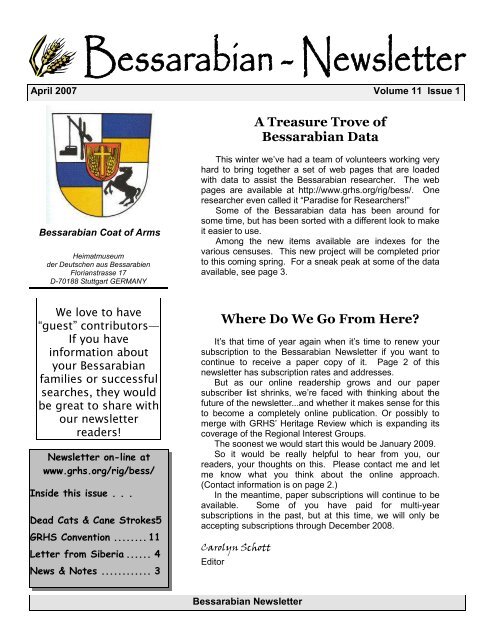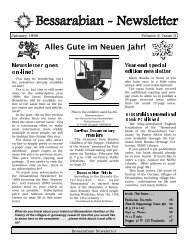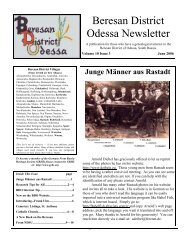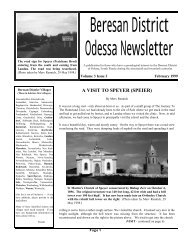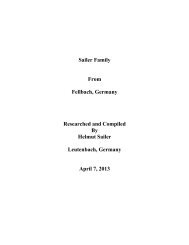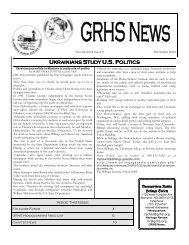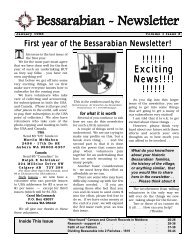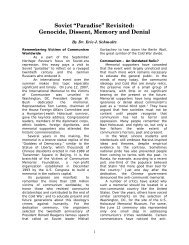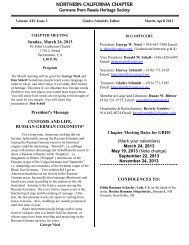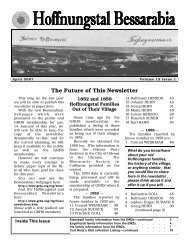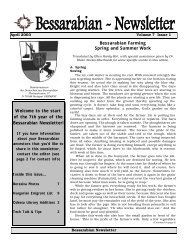Volume 11 Issue 1 - GRHS Home Page
Volume 11 Issue 1 - GRHS Home Page
Volume 11 Issue 1 - GRHS Home Page
You also want an ePaper? Increase the reach of your titles
YUMPU automatically turns print PDFs into web optimized ePapers that Google loves.
April 2007 <strong>Volume</strong> <strong>11</strong> <strong>Issue</strong> 1<br />
Bessarabian Coat of Arms<br />
Heimatmuseum<br />
der Deutschen aus Bessarabien<br />
Florianstrasse 17<br />
D-70188 Stuttgart GERMANY<br />
We love to have<br />
“guest” contributors—<br />
If you have<br />
information about<br />
your Bessarabian<br />
families or successful<br />
searches, they would<br />
be great to share with<br />
our newsletter<br />
readers!<br />
Newsletter on-line at<br />
www.grhs.org/rig/bess/<br />
Inside this issue . . .<br />
Dead Cats & Cane Strokes5<br />
<strong>GRHS</strong> Convention ........ <strong>11</strong><br />
Letter from Siberia ...... 4<br />
News & Notes ............ 3<br />
Where Do We Go From Here?<br />
It’s that time of year again when it’s time to renew your<br />
subscription to the Bessarabian Newsletter if you want to<br />
continue to receive a paper copy of it. <strong>Page</strong> 2 of this<br />
newsletter has subscription rates and addresses.<br />
But as our online readership grows and our paper<br />
subscriber list shrinks, we’re faced with thinking about the<br />
future of the newsletter...and whether it makes sense for this<br />
to become a completely online publication. Or possibly to<br />
merge with <strong>GRHS</strong>’ Heritage Review which is expanding its<br />
coverage of the Regional Interest Groups.<br />
The soonest we would start this would be January 2009.<br />
So it would be really helpful to hear from you, our<br />
readers, your thoughts on this. Please contact me and let<br />
me know what you think about the online approach.<br />
(Contact information is on page 2.)<br />
In the meantime, paper subscriptions will continue to be<br />
available. Some of you have paid for multi-year<br />
subscriptions in the past, but at this time, we will only be<br />
accepting subscriptions through December 2008.<br />
Carolyn Schott<br />
Editor<br />
Bessarabian Newsletter<br />
A Treasure Trove of<br />
Bessarabian Data<br />
This winter we’ve had a team of volunteers working very<br />
hard to bring together a set of web pages that are loaded<br />
with data to assist the Bessarabian researcher. The web<br />
pages are available at http://www.grhs.org/rig/bess/. One<br />
researcher even called it “Paradise for Researchers!”<br />
Some of the Bessarabian data has been around for<br />
some time, but has been sorted with a different look to make<br />
it easier to use.<br />
Among the new items available are indexes for the<br />
various censuses. This new project will be completed prior<br />
to this coming spring. For a sneak peak at some of the data<br />
available, see page 3.
Terms, Shorthand & URLs<br />
Organizational<br />
Village Coordinator (old Russia) ..................... VC<br />
Area Coordinator (N. America)…………. ........ AC<br />
Ort Coordinator (Germany) .............................OC<br />
German Russian .............................................GR<br />
Regional Interest Group………………. ..........RIG<br />
Village Research Project ............................... VRP<br />
GR Heritage Society...................................<strong>GRHS</strong><br />
American Historical Society GR ...............AHSGR<br />
Internet<br />
Bessarabian Web Site<br />
http://www.grhs.org/rig/bess/<br />
<strong>GRHS</strong> homepage<br />
http://www.grhs.org/<br />
Bessarabian Organizations in Germany<br />
http://www.bessarabien.de/bess/start.htm<br />
Odessa Digital Library (aka “the pixel”)<br />
http://www.odessa3.org/<br />
NDSU Libraries Ger-Rus Heritage Collection<br />
http://www.lib.ndsu.nodak.edu/grhc<br />
Genealogical Shorthand<br />
* birth/born + death/died<br />
oo m a r r i a g e<br />
Suggested dating convention - 23 Jan 1876<br />
<strong>Page</strong> 2<br />
Bessarabian Newsletter<br />
This newsletter is a publication of the <strong>GRHS</strong> Bessarabian Regional Interest Group.<br />
Published three times a year in April, August, and December<br />
Newsletter can also be viewed at http://www.grhs.org/bessarabia/<br />
Subscription Information<br />
In USA, send $4 (US) to: In Canada, send $6 (Can) to: For Back <strong>Issue</strong>s:<br />
Connie Meyer Ralph E.Schlinker Carol McCormack<br />
7010 17th Ave NE 224 Millrise Drive SW NE 24170 Highway #3 Apt #2<br />
Seattle, WA 98<strong>11</strong>5 Calgary, AB T2Y 2S6 Belfair, WA 98528<br />
Outside North America, send $7 (US) to Connie Meyer<br />
Back issues are $4(US)/year or $1.50(US)/issue<br />
Lead Editor: Carolyn Schott Frequent Contributors:<br />
13702 Densmore Avenue North Dwayne Janke<br />
Seattle, WA 98133<br />
cgschott@earthlink.net<br />
Contributing Editor/Advisor: Dale Wahl<br />
dwahl@kendaco.telebyte.com<br />
Bessarabian Newsletter<br />
V olume 1 1 <strong>Issue</strong> 1<br />
Tech Talk and Tips<br />
Have you discovered<br />
these handy places?<br />
Judy Remmick-Hubert’s site for German-Russian recipes:<br />
http://www.remmick.org/GRHouseRecipes/<strong>Page</strong>1.html<br />
A site that explains the impact of the calendar change from<br />
Julian to Gregorian for each country or region:<br />
http://homepages.tesco.net/~jk.calisto/calisto/calendars/<br />
change_dates_jg.htm<br />
The website for the Evangelische (Lutheran) Church in<br />
Württemberg:<br />
http://www.elk-wue.de/arbeitsfelder/kultur/<br />
landeskirchliches-archiv/<br />
Information on various archives in Germany:<br />
http://home.bawue.de/~hanacek/info/earchive.htm<br />
A humorous article on the importance of the German<br />
language to English:<br />
http://sfgate.com/cgi-bin/article.cgi?file=/c/a/2006/06/07/<br />
EDGDOILM3B1.DTL%20
V olume 1 1 <strong>Issue</strong> 1 <strong>Page</strong> 3<br />
Bessarabian<br />
Regional Interest<br />
Group Report<br />
The members of the <strong>GRHS</strong><br />
Bessarabian RIG Listserv will be<br />
working together to form up a<br />
matrix similar to what the Beresan<br />
and Grossliebental Districts have<br />
been using for years. This will<br />
enhance the entire Bessarabian<br />
RIG effort.<br />
VC Theophil Handel was<br />
inspired to have his <strong>Volume</strong> II for<br />
Teplitz completed and ready for<br />
sale in Germany by Christmas, but<br />
he was not able to make it. Now<br />
he is looking at next summer to<br />
have it ready. It will be another<br />
great resource and top seller!<br />
A summary of February’s<br />
<strong>GRHS</strong> Board of Directors meeting<br />
i s a va i l a b l e a t : ht t p : / /<br />
w w w . g r h s . o r g / r i g / b e s s /<br />
bulletin_board.htm. (<strong>GRHS</strong> id and<br />
password required.)<br />
For those attending the <strong>GRHS</strong><br />
convention in July, plan to attend<br />
the Bessarabian RIG’s annual<br />
meeting!<br />
<strong>GRHS</strong> 2007 Convention<br />
July 18-22, 2007<br />
Bismarck, North Dakota<br />
http://www.grhs.org/<br />
news/2007convention.htm<br />
Article on page 10 of this newsletter<br />
News and Notes<br />
SGGEE Convention<br />
August 10-12, 2007<br />
Calgary, Alberta<br />
A Sneak Peek at the<br />
Bessarabian RIG Research Site<br />
German Genealogy Conventions….Coming Soon!<br />
www.sggee.org/conventions/<br />
ConventionNews<br />
Bessarabian Newsletter<br />
AHSGR Convention<br />
June 10-17, 2007<br />
Hays, Kansas<br />
www.volgagerman.net
<strong>Page</strong> 4<br />
A Letter from Siberia<br />
Written by Friedrich Reule of Borodino<br />
A letter from Siberia (without indication of place)<br />
July 19, 1916 (August 1st by Gregorian calendar)<br />
Published by The Dakota Freie Presse, 1916<br />
Contributed by Ingrid Reule<br />
Bessarabian Newsletter<br />
V olume 1 1 <strong>Issue</strong> 1<br />
Written by:<br />
Christina Reule nee Knodel, born 14.<strong>11</strong>.1866 in Borodino, Bessarabia, oo 19.<strong>11</strong>.1895 in Klöstitz, Bessarabia,<br />
and Friedrich Reule, born 16.07.1862 in Borodino, Bessarabia.<br />
The letter was sent to the family of Andreas Reule in North Dakota:<br />
Andreas Reule, born 14.<strong>11</strong>.1866 in Borodino, Bessarabia, oo 10.01.1890 in Klöstitz, Bessarabia, + 17.10.1946<br />
in Midway Township, ND, and Margaretha Knodel, born 06.08.1862 in Borodino, Bessarabia, + 00.03.1932<br />
Cleveland, ND.<br />
Andreas and Friedrich Reule are brothers and Christina and Margaretha Reule are cousins.<br />
Wording of the letter:<br />
Our best wishes from us and our children. We are still healthy. We received your letter correctly. That was a<br />
great pleasure for us, because so we knew that we still had dear relatives who are living so far away and are<br />
thinking of us. Because otherwise we do not have any comfort in this world except the one brought by our<br />
Saviour. Our son Jakob has already gone. He had to leave our home the 18 th of May, and now he is on the way<br />
to Turkey. We’ve not yet received a message from him, and so we don’t know if he is well. They have taken<br />
away the only help we had. Now we are left with only the little ones. The eldest of them is ten years old, and<br />
the youngest 7 months. Who knows what is going to happen? Maybe they are going to take Friedrich away, too<br />
[Translator’s note: From this we have to conclude that Friedrich, the eldest son, was also still a child.] Just<br />
when the war began we received your photographs, and we were very pleased about them. These days we<br />
would be happy to be with you. But it was Friedrich’s fault, and he has felt deep regret for that. But what's the<br />
use of still worrying about it?<br />
Generally, everything is fine. We don’t suffer poverty. But what does that mean if one has everything, but the<br />
world is in a state that one has to raise children only to give them away, and with them perhaps the husband as<br />
well. We have met the great sorrow the Holy Bible is talking about. The Lord won’t listen to us any more. I will<br />
finish this letter with thousand greetings to all of you, dear brothers and sisters, with tears running. Please reply<br />
pretty soon.<br />
Friedrich and Christina Reule<br />
Remark (I.R.): The mentioned Name Friedrich refers to the father Friedrich.<br />
Translated by: Hartmut Reule
V olume 1 1 <strong>Issue</strong> 1 <strong>Page</strong> 5<br />
On Dead Cats and Cane Strokes<br />
A village teacher’s letter provides a less official look at the<br />
history of Katzbach, Bessarabia.<br />
By Dwayne Janke<br />
Arnold Winger was born in Sarata, Bessarabia, in 1899. He went on to be a teacher and sexton in<br />
Katzbach, Bessarabia, starting in 1919, and served in the village until the resettlement of 1940. 1<br />
Concerned about recording the history of Bessarabian German colonies, he contributed his “Chronicle of<br />
the Community Katzbach” for publication in the 1929 German Volks-Kalendar for Bessarabia. 2 The account is<br />
filled with a lot of factual details and so has been invaluable for a researcher, like me, whose ancestors lived in<br />
Katzbach.<br />
Recently, however, I was surprised and fascinated by Allen Konrad’s English translation of a letter that<br />
Winger wrote. 3 Again, Winger gives a post-1923 history of Katzbach, 4 but strays quite a bit from dry facts, to<br />
provide some gems of new and less formal types of information than his Volks-Kalendar account.<br />
1816 or 1821?<br />
As he does in his 1929 chronicle, Winger states something in his letter that goes against most accounts<br />
about the Katzbach colony’s founding. He says that the village was actually established (i.e. settlers first<br />
arrived) in 1816, 5 but it was not designated by the name Katzbach until 1821. If we agree with Winger’s dates,<br />
it would appear that most accepted listings of Katzbach’s establishment in 1821 are actually referring to it<br />
going from being a numbered colony in Bessarabia to one with its own unique name provided by the Crown.<br />
This idea needs to be researched further.<br />
Feline Fallacy<br />
Did most of our Bessarabian German ancestors understand the honorable origins of many of their colonies’<br />
names as coming from battles with Napoleon? Winger’s letter shows that one nearby, unnamed village didn’t,<br />
at least when it came to Katzbach. These neighbours insisted that the original settlers of Katzbach found dead<br />
felines in the Aliaga stream, hence the name: cats (Katzen) + brook (Bach) = Katzbach! Though I laughed<br />
when I first read this, residents of Katzbach were obviously not amused with the alleged derogatory origin of<br />
their colony’s name, “reject(ing) that to be a lie.”<br />
In fact, Katzbach (Kacazawa in Polish) is a small river in the Lower Silesian Voivodeship in Poland. After a<br />
length of 98 km, the Katzbach empties into the Oder River at Prochowice. The Katzbach between Legnica and<br />
Legnickie Pole was the site of the Battle of Katzbach on August 26, 1813, during the Napoleonic Wars. The<br />
“Army of Silesia,” one of four allied armies, was led by Prussian commander Bluecher. He directed an attack,<br />
with Russian army help, that saw 20,000 French soldiers who were killed, go missing or deserted in heavy rain<br />
and flooding. A jubilant King Frederick William III of Prussia awarded Bluecher the title of Prince. 6 A happy<br />
Russian Crown gave the name of the battle to the German colony in Bessarabia.<br />
A Curious Schwab List<br />
Winger’s list of settlers to Katzbach who ultimately originated from Württemberg is rather strange. In his<br />
1929 chronicle, he lists the surnames of all 81 founding families coming from Prussia, Poland, Württemberg,<br />
Baden and Schlesien. In this letter, he includes only the small section of Württemberger. Perhaps this is an<br />
indication that the letter was going to someone primarily interested in the origins of a portion of the Katzbach<br />
colonists.<br />
The Northern Germans among the Katzbach settlers were commonly called Kaschuben, and spoke a Platt<br />
dialect. By the time Winger’s letter is written, however, he observes that everyone is speaking the Schwabian<br />
dialect from Württemberg. This kind of linguistic shift is reflected in other Bessarabian colony histories I’ve<br />
read. Why did it happen?<br />
Bessarabian Newsletter
<strong>Page</strong> 6<br />
Bessarabian Newsletter<br />
V olume 1 1 <strong>Issue</strong> 1<br />
Dr. Elvire Necker-Eberhardt, who has researched Bessarabian German from a linguistic perspective, has<br />
some theories she shared with me about why Schwaebisch won out. (She noted that this was true even in<br />
marriages where one spouse spoke Schwaebisch and the other was “Kaschubisch,” Low German speaker!) In<br />
many cases, the sheer number of Schwaebisch speakers in many Bessarabian German villages lead to this<br />
linguistic domination. As well, in schools and in written materials, High German was used. Schwaebisch, she<br />
says, is a High German dialect, so it was much closer to this formal German than the “Kaschubisch” Low<br />
German dialects and so it was, in effect, reinforced. In addition, there were several kinds of “Kuschubisch”<br />
spoken from village to village in Bessarabia, reflecting differences in the dialect back in the German homeland<br />
(e.g. Brandenberg Platt, Pommern Platt, Danzig Platt, etc.)—Schwaebisch was more homogenous. Dr.<br />
Necker-Eberhardt also speculates that Schwaebisch dominated because “the Schwaebisch were and still are<br />
considered to be pretty stubborn, ‘dickkoepfig’ [thick-headed].” So, if anyone was going to switch their manner<br />
of speech in a Bessarabian German colony, it was not likely going to be a Schwaebisch speaker! 7<br />
The sample sentence Winger wrote, in what he called the Katzbach (Schwaebisch) dialect, reads as<br />
follows in English: I am a true Schwab[bian]. We always speak schwaebisch to each other. We are and will<br />
stay true Germans. We like Katzbach a lot, if only we always have good crops. 7<br />
Good or Bad Land?<br />
In his appraisal of the colony’s land, Winger seems to contradict his own 1929 chronicle, and the 1848<br />
chronicle that Katzbach officials submitted to the Welfare Committee of German Settlers in South Russia (see<br />
.) He leaves the impression that the 4,251 hectares allotted to Katzbach<br />
by the Crown was good, producing big yields with little effort. Winger seems to have changed his mind by the<br />
time he wrote the 1929 account: “The land is hilly and not very productive . . . .” and also “the land is not<br />
particularly good, therefore it must frequently be re-planted.” At first, it appears that Winger might be making a<br />
comparison between the land’s health when the settlers first arrived versus its condition a century later as he<br />
wrote the 1929 chronicle. The 1848 chronicle, much closer to the time period of Katzbach’s founding, doesn’t<br />
support this notion. “The land lies mostly on the foothills,” it says, “which affects the productivity adversely,<br />
since rain and snow water runs off too quickly.” It explains later that there were complete crop failures (1822,<br />
1823, 1824) in the colony’s initial years.<br />
No One Starves<br />
During those bad harvests, we learn about the solidarity that Katzbach colonists had towards one another.<br />
No one starved, says Winger, because the residents helped each other through these times. The colonists had<br />
already been through a lot together—difficult lives in their previous homelands, a long and demanding trek to<br />
Bessarabia (paid at their own expense), and arriving to find nothing but “a steppe covered with tall grass,” as<br />
the 1848 chronicle described it. They had no doubt gotten through this together; crop failures were not the time<br />
to end their cooperative spirit.<br />
Land for Liquor<br />
According to Winger, purchasable land was plentiful during the early years in Katzbach, so colonists with<br />
money could acquire more than the initial 60 hectares given to each family by the Crown. I have no way to<br />
determine how much a few liters of brandy were worth, but Winger claims it could buy an entire farm. The<br />
implication is that land was inexpensive in the early years of settlement, before rapid population growth among<br />
the German colonists led to extensive purchase of property for dozens upon dozens of daughter colonies over<br />
several generations, starting especially in 1860.<br />
Draining the Watering Hole<br />
After commenting on the colony’s investments in church-related items, Winger then uses what might be a<br />
tongue-in-cheek transition (i.e. “ . . . a person needs strengthening for the body, not only for the spirit. . . .”) in<br />
writing about Katzbach’s tavern(s). He wrote that it was established in 1842. Men gathered nightly there to<br />
sing, drink, talk and gamble. It was shut down “at the beginning of the war,” but Winger doesn’t specify what
V olume 1 1 <strong>Issue</strong> 1 <strong>Page</strong> 7<br />
war he means. One might assume that he was referring to the First World War, because of the implied date of<br />
his letter. However, in his 1929 chronicle, Winger said that a tavern was built in about the same time as a<br />
prayer house and village chancellery—1835—but was “torn down in about two years.”<br />
It doesn’t matter whether there were two different taverns over widely separate time periods or just one.<br />
The point worth noting here is that the community at large, displaying the conservative moral nature so<br />
common among Bessarabian German colonists, shut them down and prevented their reopening at least for<br />
some time, 8 believing that a tavern resulted in harm. As Winger’s 1929 chronicle put it, “Lately there is no wine<br />
or schnapps tavern here. No one wants to have one, particularly in this village, a good and sure sign that they<br />
understand moderation in drinking. (Here in Bessarabia, the tavern has a completely different meaning than<br />
the village inn of Banat or in Transylvanian Saxony or in Germany; here in Bessarabia, it is a shameful thing to<br />
go into a tavern.)”<br />
The Dry Alternative: Spinning Wool and Tales<br />
Meanwhile, while some men were reveling in Katzbach’s tavern, Winger writes that groups of “dry men”<br />
gathered with their “respectable” wives in quite spacious living rooms in homes. While the wives kept their<br />
hands and feet busy working their spinning wheels around a central light source, they also busily moved their<br />
tongues, talking energetically. Along the walls, the men sat or reclined on their sheepskin (coats?), smoking<br />
pipes, making up fantastic stories or chatting about “everyday problems.”<br />
Helpful and Honest<br />
Winger has some good things to say about the character of Bessarabian Germans.<br />
First, he writes that anyone finished with a farming task would help his neighbour who was not. Apparently,<br />
this was especially needed during 1877-78, the time of the Russo-Turkish War, and 1854-56, the period of the<br />
Crimean War. Winger doesn’t explain precisely why here, but gives a hint a few paragraphs later, at least for<br />
the 1877 date: “troop quartering and delivering of supplies.” In his 1929 account, he wrote that during these<br />
years “residents had to put up with much from the military which was on the march to Turkey.” Unfortunately for<br />
the colonists, Clause Nine of Alexander’s 1813 manifesto, outlining the rights and privileges of the German<br />
immigrants coming to Bessarabia, specified that, “The immigrants and their descendants shall be free . . . from<br />
providing military quarters, except when troops pass through.” It may be that this quartering in Katzbach and<br />
having to deliver supplies (not to mention dealing with disease), didn’t impact all the colonists equally. As a<br />
result, some were delayed in their farming activities more than others, and therefore neighbours helped<br />
neighbours as some got behind in their farm work.<br />
Secondly, if any item was found in a field, it would be brought to the village office to be reconnected with its<br />
owner. “Your loss is my gain” was not a motto applied to items that went missing in Katzbach.<br />
Church-going, But Superstitious<br />
Katzbach colonists were pious people, holding their pastor in high regard and consistently attending<br />
worship services in their church. But Winger emphasizes they were still superstitious, believing in “all kinds of<br />
spirits.” The writer refers to his own childhood, when ghost stories told by visitors frightened him into restless<br />
sleep.<br />
While Winger doesn’t provide any further details or examples, other sources 9 tell of superstitions among<br />
Bessarabian Germans brought from original German homelands or picked up along the way. Here are some<br />
examples: Meet a woman with a pail—empty, it’s bad luck; full, means good luck. A crying owl on the roof at<br />
night, means misfortune or even approaching death to a relative. Howling dogs, breaking an untouched tea<br />
glass or a lamp shade, a clock stopping—all bad luck. There is mention of turning to the help of witches, magic<br />
mirrors and horoscope tables, and turning to tarot card reading done by wandering gypsies. 10<br />
Thrashings and Strokings<br />
The next two paragraphs include information that is found in the 1848 and 1929 Katzbach histories<br />
(including Winger’s frustration that pursuing higher education was viewed as an excuse not to work—clergy<br />
Bessarabian Newsletter
<strong>Page</strong> 8<br />
Bessarabian Newsletter<br />
V olume 1 1 <strong>Issue</strong> 1<br />
excluded). But what is new are two clear references to corporal punishment. Winger says what most people<br />
reading his letter seem to have assumed (i.e. “It goes without saying. . . . “): school pupils “got a sound<br />
thrashing.” Winger doesn’t specify whether this was punishment for actual misbehaviour or just to encourage<br />
students to learn better!<br />
Then Winger seems to get nostalgic for “the good old days” when the colony mayor “had lots of power.”<br />
Early community records (which would make interesting reading should we be able to find what Winger was<br />
referencing) recorded that the mayor meted out punishment for “insubordination or gossip,” etc. There seemed<br />
to have been a specified number of cane strokes administered to the guilty party depending on his misdeed.<br />
And the caning was done before an audience of students as a deterrent to encourage future “proper<br />
behaviour.”<br />
Whatever one thinks of our modern legal system and society’s accepted forms of discipline, it was obvious<br />
that the Bessarabian Germans were not lenient in either case. My own grandfather, Jacob Janke, told me<br />
stories that support this view. <strong>11</strong><br />
Fashion File<br />
Winger, who is shown wearing suits, shirts and ties 12 in several class photos with his students, was not<br />
impressed with Katzbach residents’ fashion. They liked clothing styles, the way they liked food: “simple,” and<br />
not as trendy as the other German colonies. As an example, Winger says men came to village assemblies<br />
unsuitably wearing “unlined white sheepskin jacket[s].” 13 They seemed to have followed the long traditional<br />
example of the Volga Russians in this dress—another example of the surrounding Russian culture influencing<br />
the Bessarabian German lifestyle.<br />
In his 1929 chronicle, however, Winger acknowledges that slavishly following new clothing styles can be a<br />
disadvantage for Bessarabian Germans. “One can spend much unnecessary money on fashionable clothing,<br />
additionally if the money must be borrowed.” One might guess that Winger did not go into debt buying his suits!<br />
No 9-to-5<br />
Whatever Katzbachers lacked in trendy fashion, in Winger’s eyes, they made up for in their work ethic. He<br />
calls them “unsurpassed,” no doubt meaning they compared well with German colonies around them. In his<br />
1929 chronicle, the teacher wrote: “The people of Katzbach are simple farmers, always busy at their work, so<br />
that they are often finished with their threshing and corn picking when people in the neighbouring villages are<br />
still working hard at the same tasks.” Winger writes that in the busy summer months of farming, they worked<br />
18-hour days, without interruption, a pattern kept for weeks at a time.<br />
It seems the Katzbach farmers were as trendy about farming technology as they were about clothing<br />
styles. Winger says they still used “quite primitive” machinery, being suspicious about the virtues of the tractor,<br />
seeder, etc.<br />
A Final Word<br />
No doubt commenting on the tenacity and fortitude of the colony residents in the area, Winger ends by<br />
insisting that the Bessarabian German people wouldn’t disappear quickly. Of course, the writer could not<br />
foresee the future.<br />
Several decades later, they would, in fact, disappear from the steppe land of Bessarabia they had so well<br />
colonized for more than a century. In 1940, 90,000 of them were uprooted and relocated to Germany, under<br />
the Hitler-Stalin non-aggression pact.<br />
Footnotes<br />
1) See Katzbach 1821-1940, by Gertrud Knopp-Rueb, 1987.<br />
2) An English version of this account was published in the Heritage Review, Dec. 1986.
V olume 1 1 <strong>Issue</strong> 1 <strong>Page</strong> 9<br />
3) Typed transcript - [Source] Microfilm Roll #624 Serial #842 Record Group #1035 Deutsches Auslands-<br />
Institut (DAI) #1758 Frames 5420999-5421002 Translation by Allen E. Konrad, Box 205, Rowley, IA 52329,<br />
, May, 2004. It can be found on Allen Konrad’s Korner of the Bessarabian Web pages<br />
at . I wish to express my deep appreciation for Allen’s translation efforts.<br />
4) We have no way of knowing to whom Winger is writing or exactly when. It is certainly not 1816, as the DAI<br />
typed transcript was labeled. Because he mentions a 1923 incident in the village, we can safely say the letter<br />
was written at some time after this date while Bessarabia was part of Romania.<br />
Somehow the DAI got a copy of the letter. What was the DAI? An English translation of a letter (on DAI<br />
Microfilm T-81, Roll 321, Group 1035, VOMI 947, Frame 2452667-2452668) at , helps define the organization. The Deutsches Ausland Institut was created in<br />
Stuttgart in 1917. It did scientific research into the German lifestyle and the German achievements in foreign<br />
countries, providing information on all aspects of Germans living abroad. In 1938, a Research Department of<br />
German Nationality in Russia was newly created at the Institut in conjunction with the Association of Russians<br />
from Germans in Berlin. Dr. Karl Stumpp was the director of the Research Department of Germans from<br />
Russia. He was a teacher at the German Girls' High School at Tarutino, in Bessarabia.<br />
5) Winger’s1929 account says, “In the revisions-list of 1835, it is stated quite clearly that in the year of 1816,<br />
34 families settled there.”<br />
6) “The Battle of Katzbach,” written by Sam. A. Mustafa, 2002, for use with the Grande Armée game.<br />
7) Dr. Necker-Eberhardt also notes that the Schwaebisch that eventually developed in Bessarabia is different<br />
from the one they speak in South Germany. Nowadays the generation born during or after the war does not<br />
even speak it. But people with Bessarabian German roots now in Canada are often recognized as using a<br />
Bessarabian Schwaebisch. The give away is the use of the "r" in sound, some grammar peculiarities, and a lot<br />
of loanwords. You can always recognize a Bessarabian German when he uses words like "lommlich, koddrich,<br />
Deihenker," etc.<br />
Schwaebisch is an oral language. Although Winger wrote the sample Schwaebisch sentences, there is no<br />
standard form for writing it.<br />
8) My grandfather, Jacob Janke, who immigrated to Canada from Katzbach in 1910, told me in a 1979<br />
interview (see ) that the village<br />
had a “saloon” where people could drink wine. This may suggest that Winger was referring in his letter to a<br />
tavern being open until the First World War.<br />
9) See the last chapter of How We Had It At <strong>Home</strong>—The Wanderings of the Bessarabian-Germans (by J.<br />
Becker, 1950), which appeared in installments as an English translation in the Bessarabian Newsletter.<br />
10) One example is a story I heard about my grandfather Jacob Janke’s brother, who consulted a gypsy in<br />
Bessarabia before making a trip with his family to Canada in 1910. The card reader indicated that the family<br />
would make it across the ocean, but hinted that there would be some difficulty. In fact there was—their young<br />
son died of diphtheria on-board the passenger steam ship and was buried at sea.<br />
<strong>11</strong>) In an interview in 1979, he told me that anyone caught stealing, fighting or damaging someone’s property<br />
in Katzbach was not automatically sent to the authorities. Instead people took personal action. “Catch ‘em, put<br />
Bessarabian Newsletter
<strong>Page</strong> 10<br />
Bessarabian Newsletter<br />
V olume 1 1 <strong>Issue</strong> 1<br />
Mark Your Calendars for the 37th Annual <strong>GRHS</strong> Convention!<br />
Reminder: Make your plans early to attend the<br />
37 th Annual Convention of the Germans from Russia<br />
Heritage Society which will be held July 18-22, 2007<br />
at the Ramkota Hotel in Bismarck. This year’s<br />
convention will be hosted by the <strong>GRHS</strong> Board of<br />
Directors with the help of volunteers from throughout<br />
the Society.<br />
Registration, the convention bookstore, and<br />
research library will open at 1 p.m. on Wednesday,<br />
July 18. Workshops will begin on Thursday<br />
morning, July 19, while the opening ceremony is set<br />
for 10 a.m. on Thursday. The convention will be<br />
filled with workshops on interesting topics, business<br />
meetings, good food, kuchen tasting, entertainment,<br />
sing-a-longs, and much good fellowship.<br />
The Board of Directors, the convention<br />
chairpersons, and the convention committees are<br />
busy finalizing the convention program; however,<br />
everyone’s help is needed to make this an<br />
outstanding annual gathering. If you have any<br />
suggestions or comments, please feel free to<br />
contact Frances Feist at feist3368@bis.midco.net,<br />
Al Feist at afeist@westriv.com, or Rachel Schmidt at<br />
(701) 223-6167 or rachel@grhs.org.<br />
Katzbach (Continued from page 9)<br />
‘em over the bench and give ‘em lashes,” he explained, laughing. “Got a piece of branch, you know, . . . und<br />
give him about five, six, nine, 10 over the arsch [rear end] . . . .” He also recalled that there was a man<br />
appointed in the village to enforce a 10 p.m. curfew for schoolboys. “I vill tell you something,” he said. “I was<br />
standing under a tree [on the street]. I wars a young boy und he comes. ‘What you doing here so late in night?’<br />
Und hit me on my shoulder with stick.”<br />
12) See Katzbach 1821-1940, by Gertrud Knopp-Rueb, 1987.<br />
In addition to reserving the dates July 18-22,<br />
2007 on your calendar, it is important that<br />
reservations be made at the Ramkota Hotel (701-<br />
258-7700) so that you have a room at the<br />
convention center and so that you will obtain the<br />
convention rates. To obtain the rate of $79 per night,<br />
it is important to make reservations before June 18,<br />
2007 and to let the hotel personnel know that you<br />
will be attending the convention and want to be part<br />
of the <strong>GRHS</strong> block. Also located within walking<br />
distance (a block or so) are the Expressway Inn and<br />
Suites of Bismarck. They offer a special rate of<br />
$64.95 for 1-2 people, Deluxe King or Double at the<br />
Expressway Inn (1-800-456-6388) and $74.95 at the<br />
Expressway Suites (1-888-774-5566).<br />
Registration packets will be sent out in early<br />
April, but if you want to keep up with the convention<br />
planning, you can go to the <strong>GRHS</strong> website at<br />
www.grhs.org. Drop down under “News and<br />
Events” to find conventions. Updates will be posted<br />
as workshops and other events are scheduled.<br />
Don’t delay! The convention promises to be a<br />
fun-filled, learning experience. Your attendance at<br />
this annual <strong>GRHS</strong> event is important!<br />
13) Winger may not have been happy with Katzbachers wearing sheepskin coats to village gatherings, but<br />
interestingly that kind of person was exactly what Canada’s immigration officials were looking for at the turn of<br />
the 20 th century. Clifton Sifton, who was appointed immigration minister by Liberal Prime Minister Wilfred<br />
Laurier, encouraged eastern European immigrants to settle Western Canada. He considered them to be hardworking,<br />
obedient, agricultural people: “I think a stalwart peasant in a sheepskin coat, born on the soil, whose<br />
forefathers had been farmers for 10 generations, with a stout wife and a half-dozen children, is good quality.”


